

This Time Is Different: Eight Centuries of Financial Folly. Oxford University Press: Slapped by the Invisible Hand: Gary B. Gorton. Slapped by the Invisible Hand: The Panic of 2007. There are many good books on the financial crisis.

For an excellent survey on the topic I recommend the paper "Reading About the Financial Crisis: A 21-Book Review by Andrew Lo. " These authors typically espouse Irving Fisher's early The Debt-Deflation Theory of Great Depressions. They address moral hazard with distorted economic incentives. Creditors lent too much to seek short-term profits ignoring long term risk. Borrowers borrowed too much leading to an amount of debt they possibly could not repay. Gorton's book is interesting because it offers a different crisis theory. Gorton's disinformation theory has several building blocks.
Bank of America innovated the first subprime mortgage back in 1998. Gorton goes into exhaustive detail regarding the complexity of MBS structure. Gorton by analyzing a few MBS deals shows how an MBS structure is dynamic over time. The Fall of the House of Credit. How was it possible for problems in one relatively small sector in the global financial system - the American sub-prime mortgage market - to lead to the most serious economic crisis in living memory?
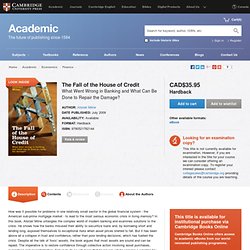
In this book, Alistair Milne untangles the complex world of modern banking and examines solutions to the crisis. He shows how the banks misused their ability to securitize loans and, by borrowing short and lending long, exposed themselves to exceptional risks when asset prices started to fall. But it has been above all a collapse in trust and confidence, rather than poor lending decisions, which has fuelled the crisis. To understand the financial crisis, read this book. Book Review If you only read one book about the financial crisis, read “The Fall of the House of Credit” by Alistair Milne, a professor of financial economics at Loughborough University in Leicestershire, UK, north of London.
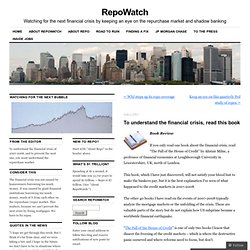
This book, which I have just discovered, will not satisfy your blood lust to make the bankers pay, but it is the best explanation I’ve seen of what happened to the credit markets in 2007-2008. The Global Minotaur: America, The True Origins of the Financial Crisis and the Future of the World Economy - Economic Controvers. Yanis Varoufakis, Professor of Economic Theory at the National and Capodistrian University of Athens, is mainly known for his work (with Shaun Hargreaves-Heap) on critical analysis of game theory.

He is however also one of the foremost currently active left-Keynesian economists. In this book, "The Global Minotaur", he sets out his analysis of the origins and nature of the current economic depression from this perspective. The book is well-written and should be generally accessible to the interested layman, but it is also rather disjointed; it has at times insufficient theoretical depth to clearly separate causes, and at the same time insufficient structuring to make it wholly work as a popular text. What a piece of work is a man - macrobusiness.com.au. We live in hyper-metarialist times, both financial materialism and scientific materialism.
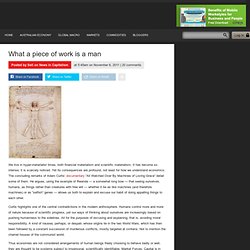
It has become so intense, it is scarcely noticed. Yet its consequences are profound, not least for how we understand economics. The concluding remarks of Adam Curtis’ documentary “All Watched Over By Machines of Loving Grace” detail some of them. He argues, using the example of Rwanda — a somewhat long bow — that seeing ourselves, humans, as things rather than creatures with free will — whether it be as like machines (and therefore machines) or as “selfish” genes — allows us both to explain and excuse our habit of doing appalling things to each other. Transcript of "Lost Decades: The Making of America's Debt Crisis and the Long Recovery" Washington, DC Friday, October 14, 2011Moderator: GEORGE AKERLOF, International Monetary FundPanelists: MENZIE CHINN, University of Wisconsin, Madison, Econbrowser JEFFRY FRIEDEN, Harvard University GAIL COHEN, Joint Economic Committee of the U.S.
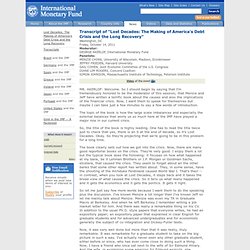
Congress DIANE LIM ROGERS, Concord Coalition SIMON JOHNSON, Massachusetts Institute of Technology, Peterson Institute MR. AKERLOF: Welcome. The Long Twentieth Century: Money, Power and the Origins of Our Time: Amazon.co.uk: Giovanni Arrighi. The Economics of Global Turbulence. The Economics of Global Turbulence. First of all, a book on economics that gets thumbs up from both The Nation & The Wall Street Journal should get a wide readership.

In the field of economics, where neoclassical and neoliberal dogmatism is dominant to the point of being stifling, it is important to open the windows to let fresh air in. The book's main thrust is to provide an alternative hypothesis to explain the postwar economic boom, and the long downturn (relative to the boom) starting in the 1970s. In the orthodox neoclassical/neoliberal account, the long downturn is explained as the result of organized labor successfully fighting for high wages, which squeeze profits, which in turn reduces investment, which slows growth. (This is an explanation that works well in economic models consistent with neoliberal ideology, but not so well in explaining empirical realities.) In Prof. This has been a short, rough summary of Prof. Los Angeles Review of Books challenges the legitimacy of economic soothsayers.
“Autumn of the Empire” is the title to Joshua Clover’s analysis of the current economic crisis, approached within the context of four books reviewed in the Los Angeles Review of Books.
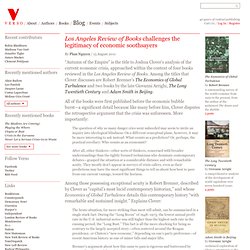
Among the titles that Clover discusses are Robert Brenner’s The Economics of Global Turbulence and two books by the late Giovanni Arrighi, The Long Twentieth Century and Adam Smith in Beijing. All of the books were first published before the economic bubble burst—a significant detail because like many before him, Clover disputes the retrospective argument that the crisis was unforeseen. More importantly: Monetary Regimes and Inflation: History, Economic and Political Relationships. I did not ask for this book, but I am glad the publisher sent it to me for free.
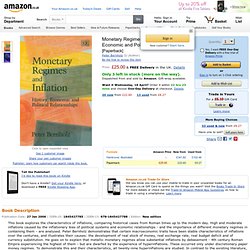
There is a lot of concern over inflation in the present era, but not a lot of structured thought about what drives inflation. This book takes the long term perspective, and looks at the wide array of monetary arrangements, and analyzes which arrangements produced more or less price inflation. The author shows that there is generally an inflationary bias in all currencies. The Holy Grail of Macroeconomics: Lessons from Japan's Great Recession: Amazon.co.uk: Richard C. Koo.
Shiller, R.: Irrational Exuberance: (Second Edition). This first edition of this book was a broad study, drawing on a wide range of published research and historical evidence, of the enormous stock market boom that started around 1982 and picked up incredible speed after 1995.
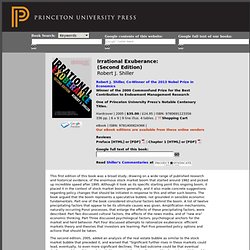
Although it took as its specific starting point this ongoing boom, it placed it in the context of stock market booms generally, and it also made concrete suggestions regarding policy changes that should be initiated in response to this and other such booms. The book argued that the boom represents a speculative bubble, not grounded in sensible economic fundamentals. Part one of the book considered structural factors behind the boom. A list of twelve precipitating factors that appear to be its ultimate causes was given. Amplification mechanisms, naturally-occurring Ponzi processes, that enlarge the effects of these precipitating factors, were described.
Review: From review of Princeton's previous edition: "Robert J. From review of Princeton's previous edition: "Mr. The Myth of the Rational Market: A History of Risk, Reward, and Delusion on Wall Street. Justin Fox - The Daily Show with Jon Stewart - 07/01/09. ECONned: How Unenlightened Self Interest Damaged Democracy and Corrupted Capitalism: How Unenlightened Self Interest Undermined Democracy and Corrupted Capitalism: Amazon.co.uk: Yves Smith.
There are many good reviews of the book published already and I don't want to repeat them. But I think there is one aspect of the book that was not well covered in the published reviews and which I think is tremendously important and makes the book a class of its own: the use of neoclassical economics as a universal door opener for financial oligarchy. I hope that the term "econned" will became a new word in English language. Neoclassical economics has become the modern religion with its own priests, sacred texts and a scheme of salvation. It was a successful attempt to legitimize the unlimited rule of financial oligarchy by using quasi-mathematical, oversimplified and detached for reality models. The net result is a new brand of theology, which proved to be pretty powerful in influencing people and capturing governments("cognitive regulatory capture"). Economics is essentially a political science.
That also means that there is no easy way out of the current situation. Free Markets and the Sinking of the Global Economy. 13 Bankers: The Wall Street Takeover and the Next Financial Meltdown. Book Description Publication Date: 1 April 2011 | Series: Vintage In spite of its key role in creating the ruinous financial crisis of 2008, the American banking industry has grown bigger, more profitable, and more resistant to regulation than ever. Anchored by six megabanks whose assets amount to more than 60 percent of the country’s gross domestic product, this oligarchy proved it could first hold the global economy hostage and then use its political muscle to fight off meaningful reform. 13 Bankers brilliantly charts the rise to power of the financial sector and forcefully argues that we must break up the big banks if we want to avoid future financial catastrophes.
Updated, with new analysis of the government’s recent attempt to reform the banking industry, this is a timely and expert account of our troubled political economy. Frequently Bought Together Customers Who Bought This Item Also Bought What Other Items Do Customers Buy After Viewing This Item? 4.2 out of 5 stars. 13 Bankers. Fault Lines: How Hidden Fractures Still Threaten the World Economy.
A Demon of Our Own Design: Markets, Hedge Funds, and the Perils of Financial Innovation: Amazon.co.uk: Richard Bookstaber. Book Description Publication Date: 28 Nov 2008 Inside markets, innovation, and risk Why do markets keep crashing and why are financial crises greater than ever before? As the risk manager to some of the leading firms on Wall Street–from Morgan Stanley to Salomon and Citigroup–and a member of some of the world’s largest hedge funds, from Moore Capital to Ziff Brothers and FrontPoint Partners, Rick Bookstaber has seen the ghost inside the machine and vividly shows us a world that is even riskier than we think.
The very things done to make markets safer, have, in fact, created a world that is far more dangerous. The Future of Finance: The LSE Report. Review The UK has been at the epicentre of both the financial crisis and the ongoing debate over the future of finance. Here the leading figures in that debate tell us how to think about the process of financial reform. Their thoughts deserve the widest possible audience, not just in Britain but in the United States and globally. —Barry Eichengreen, University of California, Berkeley A preoccupation with public good is what distinguishes this book from others about the crisis. L'impasse de la crise. Dotcom bubble 2.0 - 2011, the next dotcom bust? GFC Act I - Bank Credit Crisis.
THE GLOBAL FINANCIAL CRISIS. Economic Crisis.